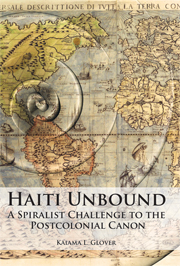Book contents
- Frontmatter
- Contents
- Acknowledgements
- Preface
- Part I Introduction: The Consequences of Ex-Centricity
- Part II Shifty/Shifting Characters
- Part III Space-Time of the Spiral
- 4 Haiti Unbound?
- 5 Present-ing the Past
- 6 Haiti in the Whirl/World
- Part IV Showing vs. Telling
- Part V Conclusions: No Lack of Language
- Works Cited
- Index
6 - Haiti in the Whirl/World
from Part III - Space-Time of the Spiral
- Frontmatter
- Contents
- Acknowledgements
- Preface
- Part I Introduction: The Consequences of Ex-Centricity
- Part II Shifty/Shifting Characters
- Part III Space-Time of the Spiral
- 4 Haiti Unbound?
- 5 Present-ing the Past
- 6 Haiti in the Whirl/World
- Part IV Showing vs. Telling
- Part V Conclusions: No Lack of Language
- Works Cited
- Index
Summary
Les Affres d'un défi and Ultravocal
The Caribbean could be seen as well as a loosely-bounded figure combining straight lines and curves, let's say, a spiral galaxy tending outward—to the universe—that bends and folds over its own history, its own inwardness.
—Antonio Benítez-RojoWe have a conception of time in a spiral that corresponds neither to the linear time of Westerners nor to the circular time of Precolumbians or Asian philosophers, but that is a sort of combination of the two, that is, a circular movement, but always with an escape from that circularity towards something else—that is what constitutes the spiral.
—Edouard GlissantThough as rich with descriptive elements as the at least nominally spatiotemporally framed narratives discussed in the previous chapter, Frankétienne's Les Affres d'un défi is, for the most part, almost entirely unreferential with respect to the configuration of time and space. The highly allegorical Bois-Neuf provides the backdrop for the stories of the named characters, and scattered references are made to Port-au-Prince as well. The great majority of the narrative spaces are, however, unidentified and unbound. They appear as a series of individual tableaux, without continuity but contextually aligned, and so mimetically display the profound dispossession and unrootedness that have historically plagued New World post-slavery communities. In its spatio-temporal incoherence, Les Affres d'un défi evokes a physical situation in space that both reflects and determines the psychological conditions of the region's inhabitants.
- Type
- Chapter
- Information
- Haiti UnboundA Spiralist Challenge to the Postcolonial Canon, pp. 157 - 178Publisher: Liverpool University PressPrint publication year: 2010



